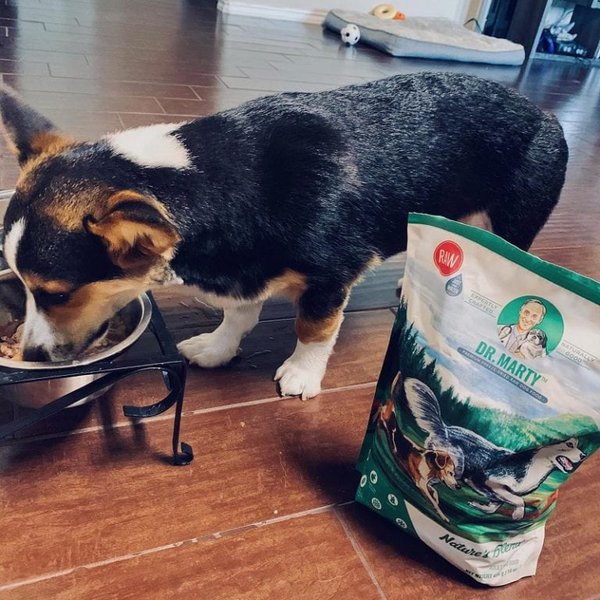The best dog food for urinary health is Purina Pro Plan Veterinary Diets For Urinary Health.
We know how you dote on your fur-baby, and how it must pain you to watch it go through urinary disorders. Worry not – with the right care, canine Urinary Tract Infection is completely curable. Our pick of the best dog food for urinary health will make bladder stones seem like a piddling issue. Pun intended!
#1 Purina Pro Plan Veterinary Diets For Urinary Health
Made in collaboration with nutritionists, researchers, and veterinarians, this incomparable dog food is chock full of high-value ingredients. No wonder most users report an instant improvement in urine quality after consumption!
Calcium oxalate and struvite crystals are the nasties that form when your dog’s urine is either too concentrated or too pH-imbalanced. Purina’s unique formula creates a urinary environment with balanced acidity levels that is unfavorable to the formation of both kinds of crystals.
What’s more, it helps dissolve sterile struvite stones (cases of non-sterile stones require further treatment with antibiotics). Continued adherence to this dog food for urinary health will also prevent the recurrence of bladder stones.
Not to be left behind in other departments, Purina comes loaded with antioxidants and top-quality proteins. Its delectable taste can make even the fastidious pet fall in love with it!
Purina makes it to the top spot on our list because of the sheer amount of painstaking research that has gone into its creation. It is made only with top-of-the-shelf ingredients that are optimized for health as well as taste – because there’s no point buying the best kibble that your dog won’t eat. We guarantee Purina is the last product you’ll ever need to buy for your furry friend’s urinary condition!
Pros
- Purina Pro Plan contains a significant amount of water to help replace fluid lost by a pooch while suffering from diseases causing dogs to pee a lot.
- This veterinary diet is specially formulated with a recipe that triggers conditions that can effectively dissolve sterile struvite stones in dogs.
- In addition to its hands-on use, the Purina Pro diet prevents the occurrence of canine urinary issues by creating a urinary environment that is unfavorable for the development of sterile struvite and calcium oxalate crystals.
- This diet contains antioxidants that help strengthen a dog’s immune system, thereby boosting the pooch’s urinary health in the process.
- The wet form of this Purina Pro diet is considerably easier for dogs to chew and swallow.
Cons
- This Purina Pro Plan diet for urinary health is only sold to those that can present valid vet approval, and this can be difficult for some people to get.
This product emerges as our top pick because the ingredients are carefully selected and formulated to prevent the formation of sterile struvite and calcium oxalate crystals for a healthy urinary tract, and not to forget, it is also packed with a great flavor that dogs love.
#2 Hill’s Prescription Diet C/D Multicare Urinary Care Dry Dog Food
Medical research tells us that dogs with a history of urinary stones must avoid excessive mineral intake. That’s because dietary minerals can sometimes encourage the formation of more and larger-sized uroliths. Ugh. Hill’s Prescription Diet boasts the perfect balance of minerals for strong bones, but no urinary stones!
Hill’s unique formula is specially formulated to dissolve struvite crystals. It also creates a pH-balanced urinary environment that prevents the recurrence of painful bladder stones. Isn’t that impressive?
This dog food is further enriched with antioxidants, potassium, and omega-3 fatty acids to fend off all nutritional deficiencies. Pick up a bag of Hill’s Prescription Diet to keep Fido healthy and spunky throughout its adult life!
Are you looking for the best diet for your beloved dog without burning a can-sized hole in your wallet? Let your search end with Hill’s Prescription Diet c/d Multicare Urinary Care Dry Dog Food. Beloved by many pet parents, it combines cutting-edge research with down-to-earth affordability. Your budget needn’t hurt your pet, right?
Pros
- This prescription diet from Hill is specially formulated to help dissolve struvite bladder stones in dogs.
- This diet’s recipe, which contains controlled amounts of magnesium, phosphorus, and calcium, creates an environment that isn’t conducive to the development of struvite and calcium oxalate stones in dogs.
- The inclusion of antioxidants and omega-3 fatty acids in this c/d Multicare recipe helps to strengthen a dog’s immune system.
- Hill’s Prescription urinary dry dog food is manufactured in the United States with ingredients gotten from reputable US-based and global sources.
- Hill’s Prescription c/d Multicare dry dog food is formulated with carefully balanced fat and sodium levels to assist consumer pooches with body weight management.
Cons
- This c/d Multicare dry dog food can only be purchased with a vet’s approval, and hence, this may not be sold readily to all customers.
- This Hill’s recipe reportedly causes vomiting and watery stools in dogs after consumption.
#3 Royal Canin Veterinary Diet Canine Urinary SO Dry Dog Food
A 20-lb can of Royal Canin Urinary SO for Dogs punches far above its weight. It primarily assists in dissolving pure struvite stones and inhibits the growth of calcium oxalate stones within the bladder. Made with chicken fat and fish oils, it has a gelatinous consistency and taste that dogs will love.
This dog food for urinary health contains therapeutic levels of sodium, which fans thirst and naturally induces your dog to drink more water, thereby diluting urine. Lowered levels of magnesium, calcium and oxalate prevent the formation of uroliths, while omega-3 fatty acids reduce inflammation in internal organs.
Royal Canin’s preferred preservative is marigold extract – nature’s very own germicide. Oh, and it can dissolve pure struvite uroliths as if they never even existed. Impressed? We bet!
Pros
- Royal Canin dry dog food helps dissolve pure struvite stones to treat existing urinary conditions in dogs.
- This canine urinary SO dry food also helps to prevent the formation of calcium oxalate stones, thereby preventing dogs from developing urinary infections in the future.
- This veterinary diet from Royal Canin features the brand-exclusive S/O index, which creates a urinary environment that is detrimental to the formation of crystal stones in a dog’s bladder.
- This dry dog food contains a healthy amount of sodium that increases a pooch’s desire to drink water, thereby replenishing fluids that are lost while urinating.
Cons
- As with most other products on this list, the Royal Canin urinary dry dog food can only be sold to those that can provide vet information at checkout.
- Prices for the Royal Canin urinary dog food are on the high side.
#4 Hill’s Prescription Diet U/D Urinary Care Dry Dog Food
Like other urinary health dog foods, this U/D urinary care product from Hill’s Prescription has carefully controlled levels of minerals to prevent further formation of bladder stones.
Flaxseed is its natural source of anti-inflammatory omega-3s, while beetroot pulp gives your pet a healthy dose of natural fiber through veggies. The highly digestible protein content keeps your dog full and healthy.
This dog food for urinary health is further enriched with Taurine and L-carnitine to promote healthy heart function. Talk about giving your furry buddy a healthy all-around diet!
This dry dog food boasts an extra boost of antioxidants that increases immunity and improves urinary health. It keeps Fido fighting fit – from the cellular level up!
Pros
- This u/d urinary care dog food is formulated with low levels of sodium and calcium to minimize the risk of the formation of non-struvite bladder stones in dogs.
- Hill’s prescription u/d dog food contains ingredients that effectively dissolve both urate and cystine stones, thereby making this a good product for managing and treating bladder stones in dogs.
- This urinary care dog food from Hill’s contains ingredients, such as taurine and L-carnitine, both of which have been proven to strengthen and support the canine heart.
- Hill’s prescription diet is fortified with antioxidants that are helpful for strengthening a pooch’s immune system, thereby putting such a dog in a better position to fight against urinary diseases.
- The limited ingredient formulation of this dry dog food, which contains a single animal protein, offers a reduced risk of reactions for pooches with food sensitivities.
Cons
- This prescription dog food can only be sold under a veterinarian’s recommendation, and it may be difficult for some customers to get vet approval.
- Hill’s Prescription diet u/d product is considerably expensive when compared to similar product listings under various brands.
#5 Blue Buffalo Natural Veterinary Diet Weight Management + Urinary Care For Dogs
Its unique grain-free, low mineral formulation combines the best of both worlds – weight management and urinary care. Anyway, you would want the very best for your four-legged family member, wouldn’t you?
Blue Buffalo W+U dog food is loaded with vegetables like peas, tomatoes, sweet potatoes, carrots, alfalfa, garlic, turmeric, parsley, and kelp to provide a boost of fiber and complex carbohydrates. Chicken and turkey are their main sources of protein.
On this wholesome diet, Fido will feel full all day, while getting all essential nutrients.
Blue Buffalo understands that sometimes urinary tract problem isn’t the only health problem your pet is struggling with. So, this is the best dry dog food for dogs that have weight as well as urinary health issues.
Pros
- This weight management recipe from Blue Buffalo is devoid of grains, chicken by-product meals, and artificial preservatives, thereby making it ideal for pooches with grain allergies and food sensitivities.
- This urinary care diet is formulated with controlled levels of minerals such as sodium and magnesium to provide added support for a dog’s urinary health.
- This Blue Buffalo weight management diet contains suitable amounts of fat and calories to assist dogs dealing with weight loss.
- This vet diet formula contains increased fiber levels to ensure easy digestion of the kibble.
- Real chicken, which is a high-quality animal protein source, is used as the main ingredient in the production of this weight management and urinary care combo product.
Cons
- Customers need to get vet approval before they can purchase this dry dog food for urinary health.
- Some dogs reportedly developed diarrhea after consuming this Blue Buffalo diet.
#6 FirstMate Australian Lamb Dog Food For Urinary Health
So, we know who your first mate is. And we’re committed to making sure it gets the best dog food that money can buy!
FirstMate Australian Lamb Dog Food gets most of its protein content from hearty grass-fed lamb meal. It has a grain-free and gluten-free formula (pea-free too!) that is perfect for pets with food sensitivities or allergies. The tiny dog food size means it can easily fit into the mouths of smaller dogs.
Fruits such as blueberries, raspberries, and cranberries add a boost of flavor guaranteed to please even the pickiest of pets. Not forgetting the fact that cranberries are great for urinary health too!
Pros
- This dog food formulation is free of gluten and grain, ideal for pooches that have an allergy to these substances.
- This FirstMate recipe contains a mix of blueberries, raspberries, and cranberries to make it more palatable and appealing to dogs.
- FirstMate dog food is suitable for dogs of all breeds that are at different stages of life.
- This dog food product boasts antioxidants that help to improve a dog’s immune system, strengthen the pooch’s urinary tract, offer better eyesight, and a host of other benefits.
- The use of grass-fed Australian lamb as the singular source of animal protein in this recipe caters to dogs with food sensitivities and also ensures that pooches derive all the nutritional benefits associated with consuming animal proteins.
Cons
- This product’s kibbles are usually too large and hard for smaller dogs to break down and chew comfortably.
- Some picky dogs reportedly refused to eat this Australian lamb food product.
#7 Addiction Grain-Free Dehydrated Dog Food For Urinary Health
Just when we thought our list of wholesome and hearty dog foods for urinary health couldn’t get any more distinguished, this divine dog food popped onto our radar.
Made with chunky, free-range venison from New Zealand’s endless pastures, its list of ingredients is a treat to behold.
Oh, and it is enriched with cranberries for better bladder health. Other fruits and veggies include papayas, potatoes, spinach, tapioca, and carrots. Can you imagine the boost of vitality Fido would get on this exceptional dog food for their urinary health?
Pros
- The Addiction dog food is produced with free-range venison to cater to dogs that are allergic or sensitive to the main sources of animal protein for dogs – chicken, lamb and beef.
- This dog food contains coconut oil that is highly beneficial to canine skin and coat health, and also ensures easier digestion of kibble.
- This dehydrated dog food is cooked at lower temperatures that are sufficient to kill harmful bacteria, while ensuring the retention of nutrients that are beneficial to pooches.
- The antioxidants that are present in the Addiction dog food prevent crystal formation in a pooch’s bladder and also fortify a dog’s immune system to make the pooch strong enough to fight against free radical damage.
- Customers can serve this dog food product to their pooches in various ways, including as a standalone meal, kibble topper, or by mixing with home-cooked food.
Cons
- When preserved for a considerable period, the kibbles of this dog food product begin to clump together and become difficult to break up and feed to pooches.
- This kibble usually contains a significant amount of hair upon unpacking, and this signifies issues with quality control checks.
Dog Food For Urinary Health Buying Guide
As a conscientious pet parent, you get your little tyke the best food that money can buy, based on its breed and age. You’ve spent hours watching the best dog training videos, reading up on canine behavior, and researching the best dog products – and more hours playing, socializing, and training your darling. Clean bowls? Check. Fresh water? Check. Long walks? Check. Cuddles? Checkmate!
You also keep a close eye on its urine and stools… And that’s why you were quick to notice the first signs of canine urinary disease and a weakening urinary health. Your carefully trained fur-baby started having frequent urinary accidents indoors (looking adorably guilty as it wet your carpet).
Perhaps you noticed it straining hard, only to pass a tiny quantity of discolored, foul-smelling urine. Or maybe you saw traces of blood in its urine and panicked.
Here are some common conundrums that torment the unwary pet parent:

What Is Canine Urolithiasis, And Why Do Good Dogs Get It?
Urolithiasis (a.k.a. Urinary Tract Infection, henceforth called UTI) is just your veterinarian’s fancy science-y lingo for crystals in your dog’s urinary tract. These nasty beasties tend to form whenever Rover’s urine becomes too concentrated or unbalanced levels of acidity and alkalinity. Crystals are mostly of two kinds – calcium oxalate and struvite stones. Both can be a source of pain, irritation, or complete urinary blockage. The last is a medical emergency that requires immediate veterinary treatment.
Causes Of Urinary Tract Infection
- General lifestyle factors like reduced water intake, lack of exercise, or inability to urinate whenever necessary (as in the case of an apartment-dwelling dog).
- An over-mineralized diet is the most common cause of Urinary Tract Infection. While magnesium, phosphorus, and calcium are essential (in moderate quantities) for bone and coat health, extra minerals are extruded from urine, where they can condense into painful stones.
- Bacterial infections are another leading cause of Urinary Tract Infection and bladder stones. More than just a therapeutic diet, this requires a full course of antibiotics.
- Miniature breed dogs are more susceptible to Urinary Tract Infection. Plus, a narrower urethra means that they are more likely to suffer from dangerous complications related to bladder stones. Among larger breeds, Bulldogs, Dalmatians, and Yorkshire Terriers are reported to have a higher propensity for developing Urinary Tract Infection.
- While both male and female canines may get urinary stones, males are rather more likely to suffer from painful or life-threatening urethral obstructions – thanks to a longer urethra. Females (especially those who have recently whelped) may develop temporary urinary incontinence.
Common Symptoms Of Canine Urinary Tract Infection
- Excessive straining while urinating.
- Decreased urine flow.
- Frequent attempts to urinate.
- Urinating in unusual places.
- Incontinence – an inability to hold urine for any length of time.
- Licking the genital area. While dogs normally lick their external genitalia while grooming themselves, constant licking should be noted by an alert owner.
- Foul smelling, cloudy or discolored urine – indicating an infection.
- Blood in urine – indicating that your pet may have abrasive urinary stones, and this prompts for an immediate appointment with your vet.
- Lack of appetite or interest should be seen as a sign of general discomfort or illness.

What’s So Special About Dog Foods That Are Created Especially To Address Canine Urinary Tract Infection?
These formulated foods contain a highly controlled quantity of minerals. Enough, so as not to disrupt regular bodily functions. Not too much, or it might condense and form bladder stones. Many brands combine healthy ingredients (such as whole vegetables and boneless meats) in ideal proportions for maximum urinary health. Medicated foods can dissolve existing struvite stones and keep the urine at an ideal pH level to prevent the formation of new stones.
We believe that canned wet foods are better than dry foods because of the higher moisture content. But depending on your pet’s needs and on your budget; your vet might recommend wet food, dry food, or a mixture of the two.
What Else Do I Need To Know About Dog Foods For Urinary Health?
Firstly, these dog food varieties must only be taken under a qualified veterinarian’s prescription. So don’t let Guru Google be your only source of information… and DO NOT self-medicate! Many foods formulated to address specific health issues can have serious side effects if taken regularly by dogs that don’t have those very health concerns. Other questions you need to ask your vet are – how long a particular variety of dog food for urinary health must be taken, and in what proportion wet and dry foods are to be blended. Don’t forget the course of antibiotics, especially if an initial check-up reveals non-sterile stones.
Secondly, do your research. Read labels, ingredients, and product reviews. Oh… Scratch that out! We’ve already compiled the best-rated prescription dog foods to keep Rover healthy and spunky!

Are There Any Home Remedies For Canine Urinary Tract Infection?
You bet! While we’d never suggest giving vet-recommended dog food a pass, there are several things you can do at home to ease symptoms of Urinary Tract Infection and prevent relapses.
- Ensure all-day availability of clean, fresh water for your pet. Food and water bowls should be washed after each use.
- Arrange frequent pee-breaks distributed evenly through the day. This is especially true if you live in a relatively confined indoor space, like a high-rise apartment.
- Ignore the puppy-dog eyes and avoid giving Fido table scraps! They’re usually high in salt, sugar, or fats – the perfect formula for a number of urinary health issues, including Urinary Tract Infection.
- For snacking in-between meals, pick high-quality whole foods, especially raw foods. They should also be low in inflammatory ingredients like refined carbohydrates and starches. Omega-3 and omega-6 fatty acids are naturally anti-inflammatory. Plus, natural fiber and probiotics are great for digestive health. Crunchy carrot sticks, anybody? Woof woof!
Final Thoughts
Thanks to our dedicated veterinary nutritionists and researchers, we’re spoilt for choice when it comes to picking the best food for our pets’ urinary issues. We need a diet that is pH balanced and provides all essential nutrients without being over-mineralized.
Plus, Rover wants it yummy… or Rover will turn his bowl over. The top pick checks all these boxes (and a few more) to arrive at the top of our recommended list. Canned packaging ensures maximum moisture, flavor, and nutrient retention while minimizing spoilage. Happy buying!





